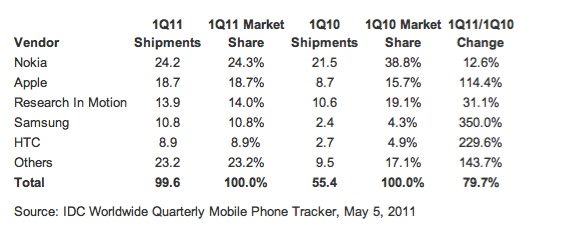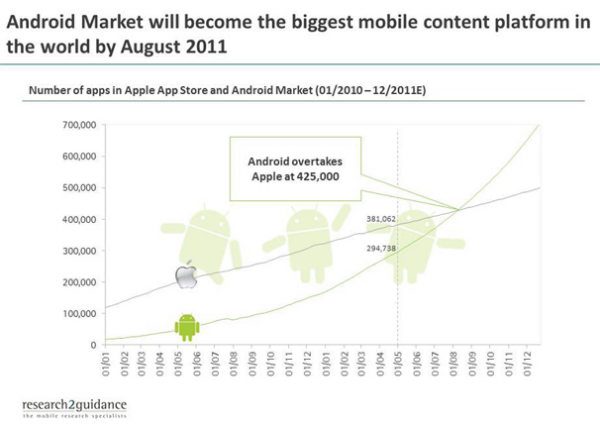
IDC figures for the first quarter of 2011 indicate that Apple is second only to Nokia in terms of smartphone shipments, with 18.7 million units sold (as opposed to Nokia's 24.2 million units). Meanwhile, RIM, Samsung and HTC trail Apple in the total 1Q 2011 shipments figure, with 13.9 million, 10.8 million and 8.9 million units respectively. However, Samsung's and HTC's growth comes primarily from their Android shipments (both also sell Windows Phone 7 smartphones), which puts Android in close quarters with Apple in terms of market share.

Which is the Preferred Mobile App Ecosystem?
It's not only in market share where smartphone platforms are battling it out, though. The mobile app marketplace is as important in the smartphone ecosystem as market share. Apple prides itself for having the biggest application marketplace so far, with the Apple App Store running more than 380,000 free and paid applications. Android closely follows suit, with Android Market having 295,000 applications as of recent count.

At their current growth rates, Android is poised to overtake Apple by August 2011, according to German firm Research2guidance. The Android app marketplace is already growing at twice the rate of Apple's, at 28,000 new applications in April for Android versus Apple's 11,000. Research company Distimo even pegs July as the point when Android overtakes iOS.
What does this say about the smartphone development environment in general?
Developers Focusing on Android
The allure of developing for the Android ecosystem probably lies in Google's open approach to applications. Google is found to be more accepting when it comes to the Android Market. Unlike Apple, which closely guards applications against impinging on certain features and functionalities that are deemed core to the iPhone (or iPad), Android allows even core functionalities of the operating system to be modified by apps.
For instance, apps like Swype and SwiftKey can serve as onscreen keyboard replacements. Apps like Contapps can be used to replace the stock Android contact list. With Android, there is more leeway for developers to build innovative applications, which can take advantage not only of the capabilities of Android, but also the capabilities of the various hardware that runs Google's mobile OS. Apple, on the other hand, wants to keep tighter control over what applications can or cannot do.
The Challenge
There is, however, a catch. While developing for Android is becoming popular, it doesn't always result in better returns to developers. In fact, Android's "free" culture means that users will prefer free apps over premium ones. This often results in developers having to resort to alternative means of monetizing their work, instead of charging a one-time fee for their apps. These might include advertisements, sponsorships or even offering their apps on a "freemium" scheme, in which the application download itself is free, but users have to pay for in-app content.
The Android Market is clearly the most dynamic app market today with the highest growth rates in terms of app numbers, but this does not necessarily mean that the chance for an average developer to generate revenue on that platform has grown as well. On the contrary, the success of an app store is negatively correlated to the success of an average developer.
Apart from the economics, the technology might also cause some difficulties. While Android is more accepting, Google's seemingly fragmented approach to development requires extra effort in terms of ensuring consistent quality. Android comes in different flavors, which are currently a smartphone line (FroYo and Gingerbread) and a tablet line (Honeycomb). Then there's Chrome OS, which is not actually Android, but is yet another competing mobile operating system developed by Google that can potentially eat into the tablet OS space.
Android also powers devices from different brands, which means that the OS is often installed on devices with different hardware capabilities, different screen sizes and even different customized interfaces. Further, the buying experience in Android Market is not exactly as streamlined and user-friendly as that in the iOS App Market, which poses an extra challenge.
Challenges notwithstanding, the Android app ecosystem is gaining momentum, and is on its way to be the biggest mobile application environment. But as with any software development environment, it's still the quality and innovativeness of the apps that count, rather than the raw size of the ecosystem. Are Android developers up to this task?
